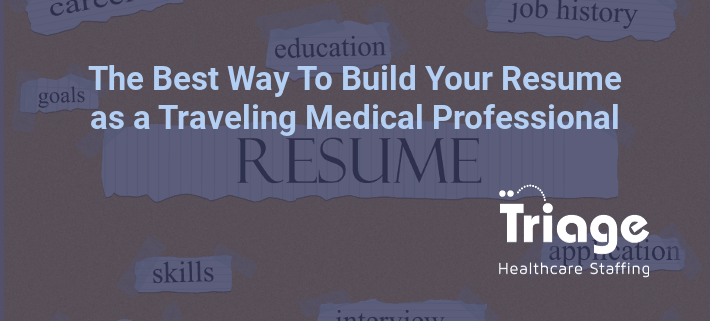The Best Way to Build Your Resume as a Traveling Medical Professional
Resumes are one of those things even the smartest, most skilled, and talented applicants dread. The reason? Because it’s tedious and time-consuming work. There’s mountains of advice for professionals on building the “right” resume. The problem? Common misconceptions lead us to believe there’s an almighty answer or format, when really, there isn’t. Resumes can be tailored specifically to the career you’re seeking, down to the length, tone, material and even the formatting.
Which yes, means there’s a general format and angle you should follow when writing up your resume if you’re looking to join the traveling medical field. Take a look at the tips below before writing anything!
Traveling Medical Professional Resume: The Outline
There is a lot of discussion online about what to include in a resume and what skills to focus on. Should there be an objective statement? What time frame is considered appropriate when adding in work experience and years of study? We recommend travelers always include the following:
- Profession and specialties in that profession
- Years of experience
- Licenses held
- Registries / certifications
- Equipment (if applicable)
- Chronological work history by facility (with a start & end date)
- General scope of work performed at each facility
- Education
- A cover letter is not necessary
It’s also helpful to study sample resumes within your specific field for trends and common formatting. This will give you a base to work with before you think about creating an outline.
Here are a few fields to get you started:
Traveling Medical Professional Resume: The Job
Every travel position is unique, which means your resume focus should be unique to the job. Study the job description and pick out details that call to you–highlight these on your resume. Often recruiters will call out preferred skills or specialties about the position. For example: whether it’s a day shift or night shift, certain certifications or specialties required to fill the job, patient load, or duration of the assignment. These small details are noteworthy even in the very early stages of communication between you and the recruiter.
Traveling Medical Professional Resume: The Research
Job descriptions for medical positions are generally pretty vague. They usually give just enough information to specify the type of professional needed, the location, and duration. If the hospital or facility is listed, do a little background checking on the facility. Research what they’re known for, check out their Facebook page and get a feel for what the culture is like.
If facilities aren’t listed, ask a recruiter from the staffing agency you’re working with and they will provide as much information as they are at liberty to share. Focus on questions about the facility that will help you better understand their needs including:
- What challenges the hospital is facing? (mention skills you have that could help solve these common challenges).
- What qualities are ingrained in their mission statement? (mention your professional mission statement as it aligns with theirs).
- What electronic advancements do they use? (mention your computer skills as they match to the facility’s equipment).
Use any details you gain from a recruiter or through online research to tailor your skills, education, and values to the hospital’s needs.
Traveling Medical Professional Resume: The Format Optimization
Before your resume makes it to a human, it will likely get processed through an applicant tracking system (ATS), which is very important for you to consider. Follow these formatting tips to ensure your resume doesn’t get stuck in the ATS process:
- Avoid fancy fonts: computers are neither impressed or compatible with fancy fonts. Stick to simple fonts like Arial, Tahoma, Times New Roman, and Georgia.
- Avoid underlining words: underlined words and phrases are difficult for an ATS to read and process.
- Avoid images, text boxes, columns, or fields: these complex formats are complicated for computers to read.
- Avoid color: black and white is best for both computers, and for those who want to print off your resume for further use/inspection.
Traveling Medical Professional Resume: The Six Essentials
Another area of resumes up for debate: the sections you should (or shouldn’t) include. As recruiting professionals for the traveling medical field, we find these six sections to be the most telling:
- Summary
- Specialties
- Licenses and Certifications
- Professional Experience
- Computer Skills
- Education
Notice the first section is summary, not objective. Stating your objective is what you want. This is your career, but you’re aiming to prove your professional worth and how you can contribute to someone’s staff. Use the summary section to highlight your skills and tell the employer what they can expect if they hire you.
Traveling Medical Professional Resume: The Length
This is where the traveling medical resume differs from any other professional position. Across all professions (except this one) we’ve been told to keep resumes to one page. Recruiters hiring for travel positions understand you’ve likely held many short-term positions, so you should demonstrate your dedication as a traveling professional. List all relevant travel experience within the last 10 years to show your depth of experience.
Traveling Medical Professional Resume: The Rundown Checklist
Before you submit your resume, run through this quick checklist to make sure you hit all the high notes. Check for:
- Errors
- Inconsistencies (fonts, font sizes, bullet styles)
- Redundancies
- Misspelled words
- Unaccounted for skills & achievements
- Key job requirements (go back and re-read the job description one last time and cross-check)
Do you check all the boxes? Your resume is ready, good luck! For additional advice on kick-starting your career as a traveling medical pro, head over to Triage Staffing to speak with one of our expert recruiters.
About the author:






